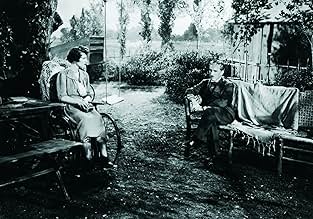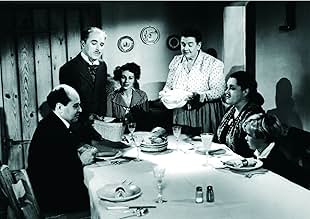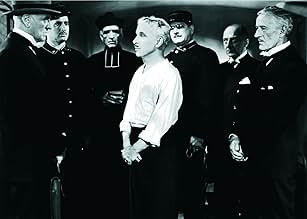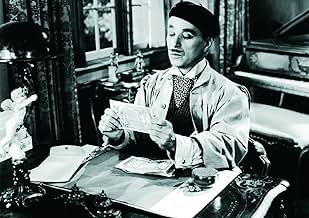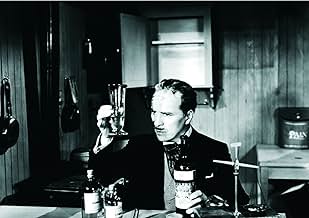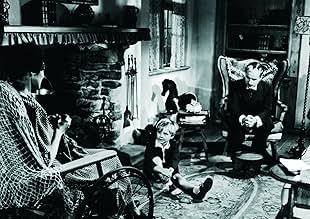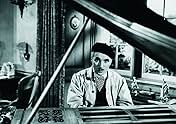VALUTAZIONE IMDb
7,8/10
20.104
LA TUA VALUTAZIONE
Un uomo gentile ma cinico sostiene la sua famiglia sposando e uccidendo donne ricche per i loro soldi, ma il lavoro presenta alcuni rischi professionali.Un uomo gentile ma cinico sostiene la sua famiglia sposando e uccidendo donne ricche per i loro soldi, ma il lavoro presenta alcuni rischi professionali.Un uomo gentile ma cinico sostiene la sua famiglia sposando e uccidendo donne ricche per i loro soldi, ma il lavoro presenta alcuni rischi professionali.
- Regia
- Sceneggiatura
- Star
- Candidato a 1 Oscar
- 6 vittorie e 1 candidatura in totale
Ada May
- Annette - Her Maid
- (as Ada-May)
Bernard Nedell
- Prefect of Police
- (as Bernard J. Nedell)
Recensioni in evidenza
A satire on a serial killer is not your everyday movie fare. I can see why audiences of that day were turned off by the Little Tramp's sudden homicidal turn. Of course, it's all treated with a light comedic hand until the moralizing end. Still, Chaplin's subtext comes through clearly at certain points-, such that unemployment can drive men to extremes when they've got a family to support.
On the other hand, not every man, of course, turns to fleecing rich widows and then dispatching them in cold-blooded fashion. But that brings him to his second point--- namely "numbers sanctify". Kill one person and you're a murderer; kill a thousand and you're a hero. Here it appears he's referring to the state that historically kills by the thousands in the name of the patriotism. Remember, the movie's coming right after the close of the horrific WWII, and he finds the point ironic.
But Verdoux's not through. Capitalism is indirectly indicted for its periodic booms and busts that lead to joblessness, and millions upon millions for munitions manufacturers who prosper during wartime. As for the consolations of religion that come at the end, the gentleman killer appears indifferent without being insulting. Since Chaplin's the sole screenwriter, it's no stretch to believe he's speaking for himself on these matters. Given this rather wholesale indictment of many of the West's leading institutions, small wonder he left the country shortly after under a cloud of controversy.
Nonetheless, the movie hits its comedic highpoints with Martha Raye as the loudly vulgar Annabella. Try as he does to do her in, she manages to comically thwart him at every turn. That scene in the fishing boat's a classic. All his polished charm and oily flattery just slide by her obnoxious silliness. Raye makes a perfect foil and an inspired piece of casting.
Of course, some of the beguiling Little Tramp remains in Verdoux's character, as when he befriends the penniless girl (Nash), or in that supremely ironic moment when he ambles Tramp-style toward the guillotine. All in all, it's a strange little movie that was apparently shelved for years for obvious reasons. Nonetheless, it was rather gutsy for Chaplin to take such chances with his established character and at Cold War's outset. It's fairly humorous until you think about its serious points, which are still worth pondering.
On the other hand, not every man, of course, turns to fleecing rich widows and then dispatching them in cold-blooded fashion. But that brings him to his second point--- namely "numbers sanctify". Kill one person and you're a murderer; kill a thousand and you're a hero. Here it appears he's referring to the state that historically kills by the thousands in the name of the patriotism. Remember, the movie's coming right after the close of the horrific WWII, and he finds the point ironic.
But Verdoux's not through. Capitalism is indirectly indicted for its periodic booms and busts that lead to joblessness, and millions upon millions for munitions manufacturers who prosper during wartime. As for the consolations of religion that come at the end, the gentleman killer appears indifferent without being insulting. Since Chaplin's the sole screenwriter, it's no stretch to believe he's speaking for himself on these matters. Given this rather wholesale indictment of many of the West's leading institutions, small wonder he left the country shortly after under a cloud of controversy.
Nonetheless, the movie hits its comedic highpoints with Martha Raye as the loudly vulgar Annabella. Try as he does to do her in, she manages to comically thwart him at every turn. That scene in the fishing boat's a classic. All his polished charm and oily flattery just slide by her obnoxious silliness. Raye makes a perfect foil and an inspired piece of casting.
Of course, some of the beguiling Little Tramp remains in Verdoux's character, as when he befriends the penniless girl (Nash), or in that supremely ironic moment when he ambles Tramp-style toward the guillotine. All in all, it's a strange little movie that was apparently shelved for years for obvious reasons. Nonetheless, it was rather gutsy for Chaplin to take such chances with his established character and at Cold War's outset. It's fairly humorous until you think about its serious points, which are still worth pondering.
As Charlie Chaplin put it when the tramp finally talked in The Great Dictator the magic was gone. Chaplin felt he had to come up with another character in order to continue his career and he got away from the lovable Little Tramp as far as he could with Monsieur Verdoux.
A whole lot of people were shocked when Monsieur Verdoux came out and instead of the Tramp we got a Bluebeard murderer. Black comedy was not a genre popular in the USA at that time and a lot of people hated this film. None more so than Hollywood columnist Hedda Hopper who as a good conservative Republican cheered on the coming blacklist and beat the drums for Chaplin's deportation. No accident that Chaplin was hauled before the House Un-American Activities Committee at the time Monsieur Verdoux came out.
Based on the famous French mass criminal Henry Desire Landru, Monsieur Verdoux tells the story of a bank clerk who lost his job and to support his family started marrying and murdering rich women. Verdoux keeps quite a schedule because he's marrying several of them at the same time. But always returns to wife Mady Correll and son Allison Roddan.
Funniest marriage is to Martha Raye who not only is he unsuccessful in killing, she nearly does him in on a couple of occasions strictly by accident. That raucous laugh might elicit sympathy from a jury if anyone ever heard it and was condemned to live with it even part time.
With the marriage to Raye comes the film's funniest sequence Chaplin trying to kill Raye when they were in a boat on a lake in Switzerland. It will not escape your attention that the sequence is borrowed from Theodore Dreiser's An American Tragedy which was already filmed in 1931 and would shortly be filmed again in 1951 as A Place In The Sun. Ironic indeed how the same plot gambits can be played for laughs or deadly serious.
Second funniest is Raye showing up at Chaplin's wedding to Isobel Elsom whom he has targeted. It forces him to leave her at the altar not knowing at that time how lucky she was.
Truth be told some of Chaplin's left wing political views are grafted into the film somewhat forcibly. It's what got Hedda Hopper's undergarments in such a twist. Still this an amusing film and not fairly judged by a lot of people at the time it came out.
A whole lot of people were shocked when Monsieur Verdoux came out and instead of the Tramp we got a Bluebeard murderer. Black comedy was not a genre popular in the USA at that time and a lot of people hated this film. None more so than Hollywood columnist Hedda Hopper who as a good conservative Republican cheered on the coming blacklist and beat the drums for Chaplin's deportation. No accident that Chaplin was hauled before the House Un-American Activities Committee at the time Monsieur Verdoux came out.
Based on the famous French mass criminal Henry Desire Landru, Monsieur Verdoux tells the story of a bank clerk who lost his job and to support his family started marrying and murdering rich women. Verdoux keeps quite a schedule because he's marrying several of them at the same time. But always returns to wife Mady Correll and son Allison Roddan.
Funniest marriage is to Martha Raye who not only is he unsuccessful in killing, she nearly does him in on a couple of occasions strictly by accident. That raucous laugh might elicit sympathy from a jury if anyone ever heard it and was condemned to live with it even part time.
With the marriage to Raye comes the film's funniest sequence Chaplin trying to kill Raye when they were in a boat on a lake in Switzerland. It will not escape your attention that the sequence is borrowed from Theodore Dreiser's An American Tragedy which was already filmed in 1931 and would shortly be filmed again in 1951 as A Place In The Sun. Ironic indeed how the same plot gambits can be played for laughs or deadly serious.
Second funniest is Raye showing up at Chaplin's wedding to Isobel Elsom whom he has targeted. It forces him to leave her at the altar not knowing at that time how lucky she was.
Truth be told some of Chaplin's left wing political views are grafted into the film somewhat forcibly. It's what got Hedda Hopper's undergarments in such a twist. Still this an amusing film and not fairly judged by a lot of people at the time it came out.
The word "Bluebeard" ("Landru" in French) has been a part of the American vernacular for some time now, synonymous with the term "wife-killer." Several variations of the infamous Parisian charmer who married then buried have been filmed over the decades - some OK, others not. John Carradine starred in a respectable but unheralded version in the mid-30s as a puppeteer-turned-perpetual strangler. A so-so French/Italian co-production in 1962 starring Charles Denner and Michele Morgan strove for dark comedy but ultimately lacked the creative spark. The worst of the lot was a wretched Richard Burton/Raquel Welch/Joey Heatherton rehash in the 70s, the nadir of Burton's screen career.
It seems most fitting then that the wry, comic genius of Charlie Chaplin, our beloved "Little Tramp," is allowed to put its delightfully macabre spin on the Bluebeard tale with 1947's "Monsieur Verdoux," winding up with perhaps the most entertaining version yet. First and foremost, it is a pleasure to hear Charlie talk. I also venture to say this is the best of his sound-era films, well-mounted and shot meticulously in black and white, in which he not only produced and directed but provided the music. Who but the loveable Chaplin, with that ever-present tinge of pathos, could play the role of a methodical, unrepentant human wife-disposal who kills purely for financial reward, and have the audience rooting for him!
Our titular hero is a charming fop of a fellow who operates his deadly deception by a precise timetable - he fastidiously charms, marries and eliminates his unsuspecting victims with keen attention paid to banker's hours! But it's Monsieur Verdoux's motive that gains the viewer's empathy. Our boy is not the mad, demented, twisted, cold-hearted monster one must think. He carries out his dastardly deeds out of selfless need. His out-of-town "business" is conducted solely in order to support and tend to his wheelchair-bound wife, a hopeless cripple and invalid, and family. His devotion, in fact, is so honorable, he succeeds in wrapping you around his little wedding finger. As much as you sympathize for the dowagers he does in, you can't help but think at least the old dears died having been graced by such a noble gentleman.
Brash loudster Martha Raye, often considered a bust in films for being intolerably larger-than-life, has one of her best roles here, grabbing her share of laughs as one of Verdoux's intended victims - a shrill, obnoxious, but verrrry wealthy dame whom nobody would really mind seeing knocked off. The problem is Charlie can't seem to off her! Every industrious attempt fails miserably. In one truly madcap scene that directly parodies Theodore Dreiser's classic novel "An American Tragedy," Charlie takes Martha, outlandishly bedecked in silver fox furs, out on a crude fishing boat excursion in the hopes of drowning the tenacious harridan. Two comic masters in vintage form.
Of course, Charlie does get his comeuppance but its all done in grand, sophisticated style. The whole movie is, in fact, so precise and polished that one must forgive him, given his controversial "subversive" leanings at the time, for tacking on an interminable, out-of-character piece of political diatribe at the finishing line. The movie's theme and bitter irony did not even pretend to disguise his great personal anguish and bitterness at America when political conservatives were breathing down his neck. Forgiven he is, for this black comedy, a sublime, eloquent retread of an old familiar creeper, comes off refreshingly original.
It seems most fitting then that the wry, comic genius of Charlie Chaplin, our beloved "Little Tramp," is allowed to put its delightfully macabre spin on the Bluebeard tale with 1947's "Monsieur Verdoux," winding up with perhaps the most entertaining version yet. First and foremost, it is a pleasure to hear Charlie talk. I also venture to say this is the best of his sound-era films, well-mounted and shot meticulously in black and white, in which he not only produced and directed but provided the music. Who but the loveable Chaplin, with that ever-present tinge of pathos, could play the role of a methodical, unrepentant human wife-disposal who kills purely for financial reward, and have the audience rooting for him!
Our titular hero is a charming fop of a fellow who operates his deadly deception by a precise timetable - he fastidiously charms, marries and eliminates his unsuspecting victims with keen attention paid to banker's hours! But it's Monsieur Verdoux's motive that gains the viewer's empathy. Our boy is not the mad, demented, twisted, cold-hearted monster one must think. He carries out his dastardly deeds out of selfless need. His out-of-town "business" is conducted solely in order to support and tend to his wheelchair-bound wife, a hopeless cripple and invalid, and family. His devotion, in fact, is so honorable, he succeeds in wrapping you around his little wedding finger. As much as you sympathize for the dowagers he does in, you can't help but think at least the old dears died having been graced by such a noble gentleman.
Brash loudster Martha Raye, often considered a bust in films for being intolerably larger-than-life, has one of her best roles here, grabbing her share of laughs as one of Verdoux's intended victims - a shrill, obnoxious, but verrrry wealthy dame whom nobody would really mind seeing knocked off. The problem is Charlie can't seem to off her! Every industrious attempt fails miserably. In one truly madcap scene that directly parodies Theodore Dreiser's classic novel "An American Tragedy," Charlie takes Martha, outlandishly bedecked in silver fox furs, out on a crude fishing boat excursion in the hopes of drowning the tenacious harridan. Two comic masters in vintage form.
Of course, Charlie does get his comeuppance but its all done in grand, sophisticated style. The whole movie is, in fact, so precise and polished that one must forgive him, given his controversial "subversive" leanings at the time, for tacking on an interminable, out-of-character piece of political diatribe at the finishing line. The movie's theme and bitter irony did not even pretend to disguise his great personal anguish and bitterness at America when political conservatives were breathing down his neck. Forgiven he is, for this black comedy, a sublime, eloquent retread of an old familiar creeper, comes off refreshingly original.
This movie is a fine example of a genre which attained enormous popularity during and in the decade after World War Two. These so-called "black comedies" (a term perhaps alluding to the funereal subject matter, ranging from fluffy (Noel Coward's "Bithe Spirit" - on stage in 1941, filmed in 1945) to darkly absurd (Ealing's "The Ladykillers" in 1955), turned death into situation comedy. Falling out of favour in the 60s, black comedy returned somewhat in the work of Robert Altman, before being brought back to full glory by the Coen Brothers.
Although the most enduringly successful example of black comedy is perhaps "Arsenic and Old Lace" (stage 1941/film 1944), two of the very greatest filmmakers blessed it with their contributions. Alfred Hitchcock to some extent incarnated the essence of it every time he introduced an episode of "Alfred Hitchcock Presents", but his definitive statement - "The Trouble with Harry" - just preceded the TV shows in 1955.
Charles Chaplin's dark vision, "Monsieur Verdoux", was released in 1947, just before the anti-Communist cries against him were to drive him out of America. A political backdrop is either entirely absent or implicit in the other examples of the genre I've mentioned, but Chaplin makes it explicit, and some might say that, to some extent, this unbalances the last reel of an otherwise utterly brilliant film. Others perhaps will be more sympathetic to the historical context. For me, while completely supporting Chaplin's observations concerning the business of war, the heavy underlining of his message does seem a flaw when viewing the film today.
All the same, "Monsieur Verdoux" is a magnificent achievement, not least in its wonderful gallery of characters, many played by character actors rarely seen on screen. Two in particular stand out, both playing wives of the much-married Verdoux: dour, unsmiling Margaret Hoffman, who goes to her death in an extraordinary scene of darkness followed by sudden light; and Martha Raye, in her best cinematic role, as the wife Verdoux fails to kill. Raye is such an explosion of energy and personality that the screen can barely contain her. To watch her and Chaplin in their scenes together is sheer joy.
The script is witty, the photography excellent, and Chaplin's penchant for sentimentality is held well in check. It is, except for the end, an unusually subtle movie, its tone completely in keeping with its French setting.
Although the most enduringly successful example of black comedy is perhaps "Arsenic and Old Lace" (stage 1941/film 1944), two of the very greatest filmmakers blessed it with their contributions. Alfred Hitchcock to some extent incarnated the essence of it every time he introduced an episode of "Alfred Hitchcock Presents", but his definitive statement - "The Trouble with Harry" - just preceded the TV shows in 1955.
Charles Chaplin's dark vision, "Monsieur Verdoux", was released in 1947, just before the anti-Communist cries against him were to drive him out of America. A political backdrop is either entirely absent or implicit in the other examples of the genre I've mentioned, but Chaplin makes it explicit, and some might say that, to some extent, this unbalances the last reel of an otherwise utterly brilliant film. Others perhaps will be more sympathetic to the historical context. For me, while completely supporting Chaplin's observations concerning the business of war, the heavy underlining of his message does seem a flaw when viewing the film today.
All the same, "Monsieur Verdoux" is a magnificent achievement, not least in its wonderful gallery of characters, many played by character actors rarely seen on screen. Two in particular stand out, both playing wives of the much-married Verdoux: dour, unsmiling Margaret Hoffman, who goes to her death in an extraordinary scene of darkness followed by sudden light; and Martha Raye, in her best cinematic role, as the wife Verdoux fails to kill. Raye is such an explosion of energy and personality that the screen can barely contain her. To watch her and Chaplin in their scenes together is sheer joy.
The script is witty, the photography excellent, and Chaplin's penchant for sentimentality is held well in check. It is, except for the end, an unusually subtle movie, its tone completely in keeping with its French setting.
Charlie Chaplin is "Monsieur Verdoux" in this 1947 film based on the real-life serial killer Henri Landru. Verdoux is a bank clerk who is laid off late in life and turns to marrying and killing women for their money in order to support his invalid wife and child. Sounds brutal, and when you think about it, it really is, but Chaplin as usual manages to couch his message in comedy. While we see that he is successful in knocking off a couple of women and getting their money (though we never actually see a murder), Verdoux has a couple of failures as well, and there the fun begins. One of his women, Annabella Bonheur, is played hysterically by Martha Raye as a vulgar loudmouth eternally suspicious of Verdoux, who is posing as a boat captain. He tries some different ways of killing her, but no matter what he does, nothing works. He then turns his attention to another woman he's been chasing for some time, Marie Grosnay (Isobel Elsom). He's about to walk down the aisle when who does he see as a guest at the wedding - Annabelle. His attempts to get out of the house are priceless.
Despite some genuinely comical scenes, the speech that Verdoux makes gives its deeper message - Verdoux was in it for the money. To him, the women were business propositions to be exploited. His point is that what he has done on a smaller scale is being done by dictators worldwide; people are not treated as human beings but merely for economic gain, for power and for exploitation. Though Verdoux's argument doesn't absolve him of responsibility or justify his actions, the warning is a good one - people need to care more about each other and about what's going on in their world, and put their attention on really important matters like suppression of the masses. Why, he asks, are the headlines full of Verdoux and not of what is going on around the world? (The film's ending takes place in 1937.) It's interesting to consider what would have happened to this story in the hands of Orson Welles, whose idea it was originally. He wouldn't have made it a comedy. It would have been a drama or a detective story. Only Chaplin would think of making the story of a serial killer into a comedy of sorts. Certainly 1967's "No Way to Treat a Lady" takes a page or so from this script.
"Monsieur Verdoux" wasn't well received by the public - at all - and by 1947, people were questioning Chaplin's politics instead of reveling in his genius. It possibly was ahead of its time; it certainly wasn't appreciated as it is today. The movie is not without some problems, the biggest one being, what the heck happened to Verdoux's wife and child? It is never explained.
"Wars, conflicts - it's all business. One murder makes a villain; millions a hero. Numbers sanctify." Charlie Chaplin as Verdoux said that 61 years ago.
Despite some genuinely comical scenes, the speech that Verdoux makes gives its deeper message - Verdoux was in it for the money. To him, the women were business propositions to be exploited. His point is that what he has done on a smaller scale is being done by dictators worldwide; people are not treated as human beings but merely for economic gain, for power and for exploitation. Though Verdoux's argument doesn't absolve him of responsibility or justify his actions, the warning is a good one - people need to care more about each other and about what's going on in their world, and put their attention on really important matters like suppression of the masses. Why, he asks, are the headlines full of Verdoux and not of what is going on around the world? (The film's ending takes place in 1937.) It's interesting to consider what would have happened to this story in the hands of Orson Welles, whose idea it was originally. He wouldn't have made it a comedy. It would have been a drama or a detective story. Only Chaplin would think of making the story of a serial killer into a comedy of sorts. Certainly 1967's "No Way to Treat a Lady" takes a page or so from this script.
"Monsieur Verdoux" wasn't well received by the public - at all - and by 1947, people were questioning Chaplin's politics instead of reveling in his genius. It possibly was ahead of its time; it certainly wasn't appreciated as it is today. The movie is not without some problems, the biggest one being, what the heck happened to Verdoux's wife and child? It is never explained.
"Wars, conflicts - it's all business. One murder makes a villain; millions a hero. Numbers sanctify." Charlie Chaplin as Verdoux said that 61 years ago.
Lo sapevi?
- QuizVerdoux's quote "One murder makes a villain; millions a hero" is taken from the abolitionist Bishop Beilby Porteus (1731-1808).
- BlooperWhen Monsieur Verdoux states the area of the house being sold he mentions the lengths in feet. As the film is set in France, he should have used meters.
- Citazioni
Henri Verdoux: Wars, conflict - it's all business. One murder makes a villain; millions, a hero. Numbers sanctify, my good fellow!
- Versioni alternativeThe West German theatrical version was cut by approximately 15 minutes.
- ConnessioniFeatured in Amore a prima svista (2001)
I più visti
Accedi per valutare e creare un elenco di titoli salvati per ottenere consigli personalizzati
- How long is Monsieur Verdoux?Powered by Alexa
Dettagli
- Data di uscita
- Paese di origine
- Siti ufficiali
- Lingue
- Celebre anche come
- A Comedy of Murders
- Luoghi delle riprese
- Azienda produttrice
- Vedi altri crediti dell’azienda su IMDbPro
Botteghino
- Budget
- 2.000.000 USD (previsto)
- Lordo Stati Uniti e Canada
- 64.636 USD
- Lordo in tutto il mondo
- 65.718 USD
- Tempo di esecuzione
- 2h 4min(124 min)
- Colore
- Proporzioni
- 1.37 : 1
Contribuisci a questa pagina
Suggerisci una modifica o aggiungi i contenuti mancanti


